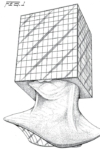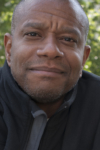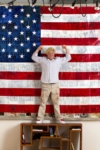by Max Rivlin-Nadler
Julius, the young psychiatrist whose thinking is so deftly realized in Teju Cole’s debut novel, Open City, covers a good amount of Manhattan on foot. He wanders through his sadness, observing how history weaves itself into the crowded islands’ buildings, wreckage, and even the hidden footpaths of the long-dead natives. Separated from his native Nigeria by resentment, time, and trauma, Julius treats the clinically depressed at Columbia-Presbyterian while soberly addressing his own suspicion of a worsening emotional miasma and its many symptoms, including the terrifying return of bedbugs. He recounts how after the Statue of Liberty’s completion, birds would die by the hundreds each night, crashing into its illuminated flame. He passes through Washington Heights, observing how grand theatres of the twenties now house diminishing congregations, and continue to look both oddly decadent and depraved. He looks into the hole at Ground Zero, which, in these wanderings of 2006, was still just that. He stands in an empty antique shop in Chinatown, watching a marching band pass by the statue of an Opium War hero, thinking, “To be alive, it seemed to me, as I stood there in all kinds of sorrow, was to be both original and reflection, and to be dead was to be split off, to be reflection alone.”
This is an emotional novel, but more precisely, it is the emotional as political, which is to say, it is an existential book. Its emotional passages, which are mostly in New York City, bookend an incredibly clear and serious political passage, which takes place in a coffee shop in Brussels. Julius, a well-read intellectual who, like all underground men, is “distrustful of causes”, meets a displaced Moroccan named Farouq. Farouq harbors a deep resentment of the West, while still versed in its reactionary left, admiring Said, De Man, and Norman Finkelstein. Farouq’s anger and support of violence is met by Julius’s cynicism and he meditates on the dilemma of the contemporary young left, “It seemed as if the only way this lure of violence could be avoided was by having no causes, by being magnificently isolated from all loyalties. But was that not an ethical lapse graver than rage itself?” The distrust of causes, the cynicism that has crept into any meaningful political discussion, might be even greater a crime than outward destruction. But at least it’s a personal destruction, Julius reasons. Later in Brussels, a well-heeled surgeon muses, “For people to feel that they alone have suffered, it is very dangerous.”
So Julius attempts to only do good, to maintain his relative neutrality, reasoning, “Perhaps this is what we mean by sanity: that, whatever our self-admitted eccentricities might be, we are not the villains of our own stories”. Even after being beaten only blocks from his apartment, he maintains his resolution to be the rueful and reasoned protagonist, even as beehives collapse. He maintains his own heroism even, in a brilliant conclusion, Julius is confronted with the revelation of his own villainy.
Open City is an incredible novel whose existence, in my mind, laughs in the face of all the self-proclaimed “sad young literary men” who speak authoritatively and dismally about literature from their well-financed soapboxes. Open City is a brilliant and unrelentingly smart novel by a talented writer who still has interesting things to say even at this apparently late hour. I hope Open City finds itself in the hands of every young person who wants to be political and thoughtful and not a complete asshole. It’s a book that wants one to be mindful of history while thinking for oneself. Incredibly, it actually takes itself seriously while also embracing its reader . Most importantly, it asks the reader to take a walk.
This post may contain affiliate links.








